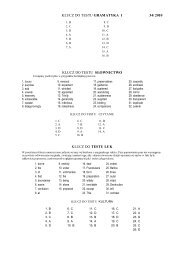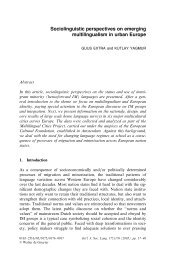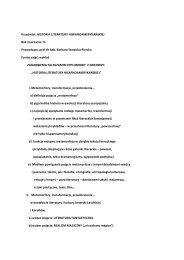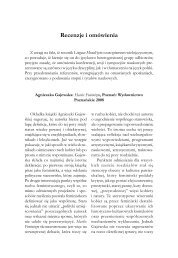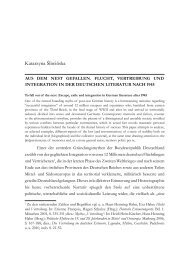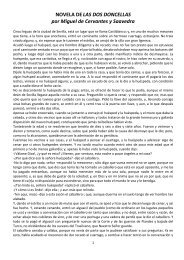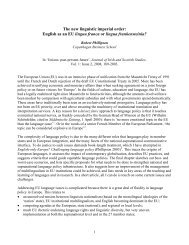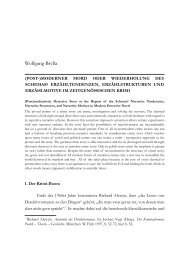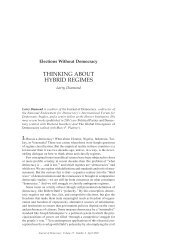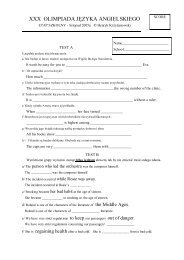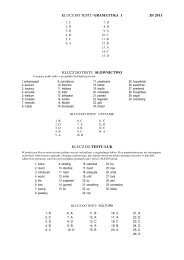African American women and feminism: Alice Walker's womanism ...
African American women and feminism: Alice Walker's womanism ...
African American women and feminism: Alice Walker's womanism ...
Create successful ePaper yourself
Turn your PDF publications into a flip-book with our unique Google optimized e-Paper software.
<strong>African</strong> <strong>American</strong> <strong>women</strong> <strong>and</strong> <strong>feminism</strong>: <strong>Alice</strong> Walker’s <strong>womanism</strong> as a proposition of a dialogic encounter 13<br />
In 1990 Black sociologist Patricia Hill Collins pointed to the revolutionary<br />
potential of placing <strong>African</strong> <strong>American</strong> <strong>women</strong>’s experience at the center of analysis<br />
of processes of domination in the redefinition of “either/or dichotomous<br />
thinking of Eurocentric, masculinist thought” 14 . This role is crucial due to the<br />
fact that <strong>African</strong> <strong>American</strong> <strong>women</strong> are most profoundly affected by the interlocking<br />
systems of race, class <strong>and</strong> gender oppression “within a more generalized<br />
matrix of domination” 15 . <strong>African</strong> <strong>American</strong> <strong>women</strong>’s experience of oppression<br />
rejects the possibility of applying additive models, that is of analyzing race, class<br />
<strong>and</strong> gender as competing hierarchical frameworks for analyzing oppression (as<br />
racist <strong>and</strong> economic <strong>and</strong> sexist) but calls for a new theoretical framework of<br />
intersectionality, which is a paradigm viewing race, class <strong>and</strong> gender (sexuality,<br />
age <strong>and</strong> ethnicity might be added here) as mutually constructing systems of<br />
power, which both shape <strong>and</strong> are shaped by <strong>African</strong> <strong>American</strong>s 16 . Assuming<br />
the intersectional paradigm has allowed Collins to analyze how excluded groups<br />
of <strong>African</strong> <strong>American</strong>s may be penalized <strong>and</strong> simultaneously enjoy privilege<br />
depending on the context. For example, Black men may be penalized by their<br />
race but are privileged by gender in their race, while white <strong>women</strong> are penalized<br />
by their gender but are privileged by their race. Consequently, an individual<br />
might be a member of an oppressor <strong>and</strong> an oppressed group at the same time.<br />
Black feminist critics, for example, are penalized by their race <strong>and</strong> gender but<br />
they are simultaneously privileged by their class (as is sometimes pointed out<br />
by womanist <strong>and</strong> <strong>African</strong>a critics).<br />
On the one h<strong>and</strong>, this particularly vulnerable, intersectional position of <strong>African</strong><br />
<strong>American</strong> <strong>women</strong> has made it necessary for them to constantly interrogate<br />
feminist thought which has colonized colored <strong>women</strong> in the gender framework<br />
that neglects the role of racism. On the other h<strong>and</strong>, they interrogate <strong>African</strong><br />
<strong>American</strong> antiracist politics which gives priority to “race as a consensus issue<br />
[because it affects all group members] while assigning gender <strong>and</strong> sexuality<br />
a secondary status as crosscutting issues [because they affect only certain segments<br />
of the group]” 17 . As a result, <strong>African</strong> <strong>American</strong> <strong>women</strong> are engaged in<br />
a dialogic relation with feminists (as <strong>women</strong> <strong>and</strong> as colored persons) <strong>and</strong> with<br />
Black men (as colored persons <strong>and</strong> as <strong>women</strong>), simultaneously <strong>and</strong> respectively<br />
affirming identity with <strong>and</strong> asserting difference from both groups which assign<br />
colored <strong>women</strong> marginal positions in their discourses <strong>and</strong> politics 18 .<br />
14<br />
P. H. Collins: Black Feminist Thought, op.cit., p. 225.<br />
15<br />
P. H. Collins: Black Feminist Thought, op.cit., p. 226.<br />
16<br />
P. H. Collins: Black Sexual Politics. New York & London: Routledge, 2005, p. 351.<br />
17<br />
P. H. Collins: Black Sexual Politics, op.cit., p. 47.<br />
18<br />
M. G. Henderson: Speaking in Tongues: Dialogics, Dialectics, <strong>and</strong> the Black Woman Writer’s Literary<br />
Tradition. In: <strong>African</strong> <strong>American</strong> Literary Theory: A Reader. Ed. W. Napier. New York <strong>and</strong> London:<br />
New York University Press, 2000, pp. 348-368.



